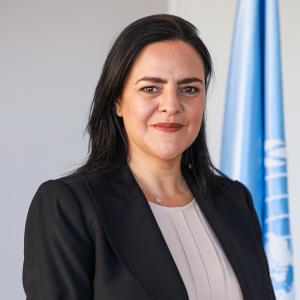Good morning.
It is my pleasure to join my voice to Dr. Julitta’s and welcome you to the 4th Malaysian Women and Girls Forum, organized under the theme ‘Women and Nation Building’.
Congratulations to UNFPA and the MWGF Secretariat for bringing us again together.
Past editions of this forum have served as vibrant platforms to critically examine the barriers that women and girls face, fostering a shared understanding of Malaysia’s legal and policy landscape. These discussions have delved deeply into the root causes of inequality, viewed through multiple lenses—economic, social, environmental, cultural, demographic, and human rights.
Such a comprehensive approach was indispensable for moving beyond reflection and analysis toward actionable, solution-oriented strategies. We have long acknowledged the barriers facing women and girls, and the evidence is clear.
The challenges have been studied, documented, and debated. The data, albeit insufficient, has told us at least part of the story. It is now time to shift the conversation from understanding the problems to driving actionable, transformative solutions.
This is precisely what today’s Forum seeks to achieve, making the choice of theme both timely and profoundly significant.
Esteemed guests,
Nation building, in its broader sense, is about fostering societal progress, resilience, and shared prosperity. Women’s participation strengthens this foundation by bringing diverse perspectives to leadership, expanding the talent pool, and driving innovation across sectors.
When women have a voice in political decision-making, equitable policies flourish. When they are supported to thrive in the workforce, economies grow stronger and more inclusive. And when their leadership is normalized, societies move closer to their highest potential.
Malaysia is no exception. From the nation's early days, women have been instrumental in shaping Malaysia’s destiny. We must acknowledge the invaluable contributions of the pioneering women who paved the way. They have defied societal norms, challenged the status quo, and broken down barriers. What Malaysian women have achieved in nation building has inspired generations and their legacy serves as a powerful reminder of our moral obligation to raise the bar even higher.
We often hear the argument that reforms must be grounded in Malaysia’s unique socio-economic and cultural realities. While this is important, it should never be seen as an excuse to aim lower. Rather, as Malaysia is bold and forward-looking in its pursuit of economic growth, sustainability, innovation and technological leadership, empowering women and girls must stand as a central and equally ambitious priority.
Educated, healthy, resilient, equal, and fully empowered women and girls are not only essential enablers of progress but also a defining marker of a nation’s development. The challenge, and the solution, lies in reimagining gender roles and creating the enabling environment for women to translate their education and skills into meaningful economic participation, political representation and leadership.
Ladies and Gentlemen,
The call for bold steps to invest in women and girls resonates more strongly today as the world grapples with complex crises and existential threats.
The SDGs have stalled. Progress toward SDG 5 in particular (achieving gender equality and empowering all women and girls) has been disappointingly slow. Many targets are off track, and some indicators even show regression.
The review at the 30-year mark of the Beijing Declaration and Plan of Action has highlighted the persistent and pervasive challenges women and girls face globally. Despite decades of advocacy and activism, the distance to equality is over a century long. Many women and girls continue to experience discrimination, violence, and limited opportunities.
Progress in implementing the provisions CEDAW has been uneven, despite the legally binding nature of this important convention.
And while several milestones are worth celebrating, building a future where women and girls can fully participate and lead, a future of prosperity, equity, and sustainability, requires stronger political will, determination, and the active engagement of all sectors of society.
As Malaysia stands on the cusp of high-income status, the full and effective inclusion of women in the nation’s economic, political, and social fabric is essential for building a prosperous and equitable future. Addressing the complex challenges of the “last mile” in achieving the SDGs in Malaysia requires the full partnership of women and men, standing shoulder to shoulder to shape a just and prosperous society.
Together, they must challenge inequality, confront injustice, and promote democracy and human rights. Fathers, sons, brothers, and husbands must be allies in this journey, championing a future where everyone’s potential is realized.
The voices of half the population must be heard, valued and celebrated. Advancing women’s political participation is a cornerstone of a healthy democracy, of a nation where every individual is empowered with equal rights to shape decisions that impact their lives and to contribute to the collective good.
I am confident that today’s discussions will inspire practical steps to tackle the challenges we know well and move closer to solutions proven to have accelerated progress towards true equality.
I close by reaffirming the UN’s unwavering commitment to leveraging our knowledge, technical expertise, and convening power to support advocacy and co-create policy solutions that bring us closer to true equality and a future where everyone’s potential contributes to nation-building.
Thank you.







